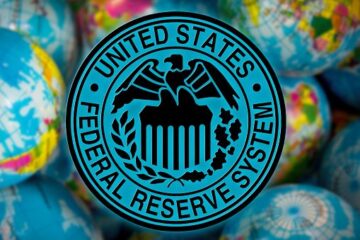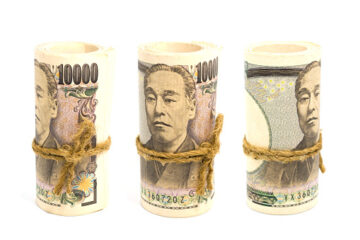President Trump unveiled his grand tariff strategy in the late afternoon on April 2, probably expecting the stock market to hate the plan. And it did. The Standard & Poor’s 500 Index fell 597 points, or 10.5%, over the next two days.
To put the debacle into perspective, the S&P 500’s beatdown was its biggest two-day point loss since the end of 2007, bigger even than the 2-day loss the index suffered as the Covid-19 pandemic erupted in 2020.
💵💰Don’t miss the move: Subscribe to TheStreet’s free daily newsletter 💰
While many Americans may have been reeling from the magnitude of the stock market’s decline, something else was going on. The bond market was reacting, too, only a little later.
The 10-year Treasury yield, after falling in tandem with stocks on April 3 and April 4, started to move higher. From 4.009% on Friday, the yield rose to 4.177% on Monday. Then, to 4.304% on Tuesday. Early Wednesday, the yield had jumped above 4.5%, a jump so dramatic even the president had to take notice.
Related: Tariffs could lead to major nightmare for U.S. tech stocks
The bond market, he told reporters Wednesday morning, had become a little “yippy.” That’s a golfing term used to describe a player too nervous to putt effectively.
As a result, he had to decided to suspend for 90 days most of the tariffs imposed only a week before, and stocks soared in a monstrous relief rally on Wednesday and in a second rally on Friday.
But the 10-year yield kept rising anyway. It reached nearly 4.6% before closing at 4.5% on Friday. The 10-year note’s close was its highest since February. It pushed up one measure of 30-year mortgage rates — from Mortgage News Daily — 7.1% from 6.6% a week earlier.
Which translates into this: The monthly principal and interest payment on a $250,000, 30-year fixed rate mortgage rose from $1,597 to $1,675, a 4.9% increase.
Uncertainty lies ahead
So, yes, stocks recovered by Friday (though still way off from their all-time highs), but bond yields did, too. So, the story may not be over yet. We’ll see how markets react next week and over the next 90 days. (Bitcoin was up 11% between its Tuesday low and its Saturday close.)
The trade fight between the United States and China has become extremely intense.
The overall trade controversy was muted a bit by the Trump Administration’s move late Friday to exempt the worst of the tariffs on smart phones, computers, semiconductors and related products made or assembled in China.
Apple (AAPL) was relieved. It assembles most of its iPhones in China. Apple jumped 4.1% on Friday. Nvidia (NVDA) was up 3.1%.
The United States has imposed 145% tariffs on Chinese goods. China has responded with 125% tariffs on imports from the U.S.
Related: Apple gets a huge break from Trump tariffs
A key audience did not cheer
Still, everyone should pay attention because, when it comes to the price of money, the bond market rules all. As this past week or so clearly showed, the bond world was not impressed.
Normally, bond brokers and investors don’t make a lot of noise. Underwriters sell bonds for clients to investors, often pension funds, insurance companies, and others.
Each side has its motivations:
The investors want to put cash to work in a conservative, stable predictable way because they have obligations to meet, like paying dividends, pensions to pensioners or having reserves sufficient enough to pay off insurance claims, maintaining reserves for emergencies.The clients can be governments, banks, companies, state and local agencies, hospitals, school districts, colleges and universities, hospitals and the like who need capital to grow, add new factories, build bridges, highways, schools or hospital additions.
A trader reacts to a news photographer on the New York Stock Exchange floor on Thursday as Wall Street stocks opened decisively lower Thursday.
CHARLY TRIBALLEAU/Getty Images
Over the term of the bond, the clients pay a specific rate of return, usually twice yearly. At the end of the term, the clients repay or refinance the face amount of the each bond.
This is a huge business, larger than the stock market. The global bond market was worth $140.7 trillion at the end of 2023, compared to the $115 trillion global equity market, according to the Securities Industry and Financial Markets Association (SIFMA).
It is a critical piece of any economy. The New York Canal, a 41-mile irrigation canal that’s been bringing water to southwest Idaho farmers since its 1909 opening, got its name from the New York investors who contributed early capital for its development.
A plan with many critics
The Trump tariff plan did not seem especially well thought out. Legions of conservatives, even The Wall Street Journal, joined liberals in panning it publicly.
Stocks crashed and then the bond market reacted by selling U.S. treasuries, pushing yields higher.
Can one say who has been doing the selling?
Related: Billionaire Jeffrey Gundlach sends blunt warning on stocks, bonds
No, the business is run by people who want to be discrete. But the selling has been unmistakable. More than “yippy?” (To use the president’s phrase.) Maybe.
And there’s motivation because what made the U.S. exceptional in growth, innovation, and opportunity has faded, Wall Street Journal columnist Greg Ip wrote this week. “The U.S. is still exceptional, but it is also less predictable, more antagonistic, and more isolated. For foreign investors, that makes it less safe.”
More experts:
Treasury Secretary has blunt 3-word response to stock market dropFed chairman has blunt 9-word response to recession talkBillionaire Ray Dalio’s blunt message on economy turns heads
The lever on the U.S. economy
This may prove the great weapon against the Trump plan. Non-U.S. investors own $8.5 trillion in treasury securities, led by:
Japan, the leading holder with $1 trillion alone.China with $760.8 billion. The United Kingdom with $740.2 billion.
All they have to do is start selling more aggressively, and yields will jump, causing all sorts of havoc in the U.S. Treasury market.
There’s another market that’s vulnerable: the mortgage market. Lenders make loans to home owners, using capital raised by selling bonds specifically earmarked for housing.
A Diana Olick report on CNBC broadcast Friday noted there are $1.32 trillion in mortgage securities outstanding. About 15% are held by foreign investors. The biggest holders: Japan, China, Taiwan and Canada.
Both Japan and China have been reducing their holdings. If they decided to dump the positions, the effect on the mortgage market could be considerable.
Related: Veteran fund manager who forecast S&P 500 crash unveils surprising update


